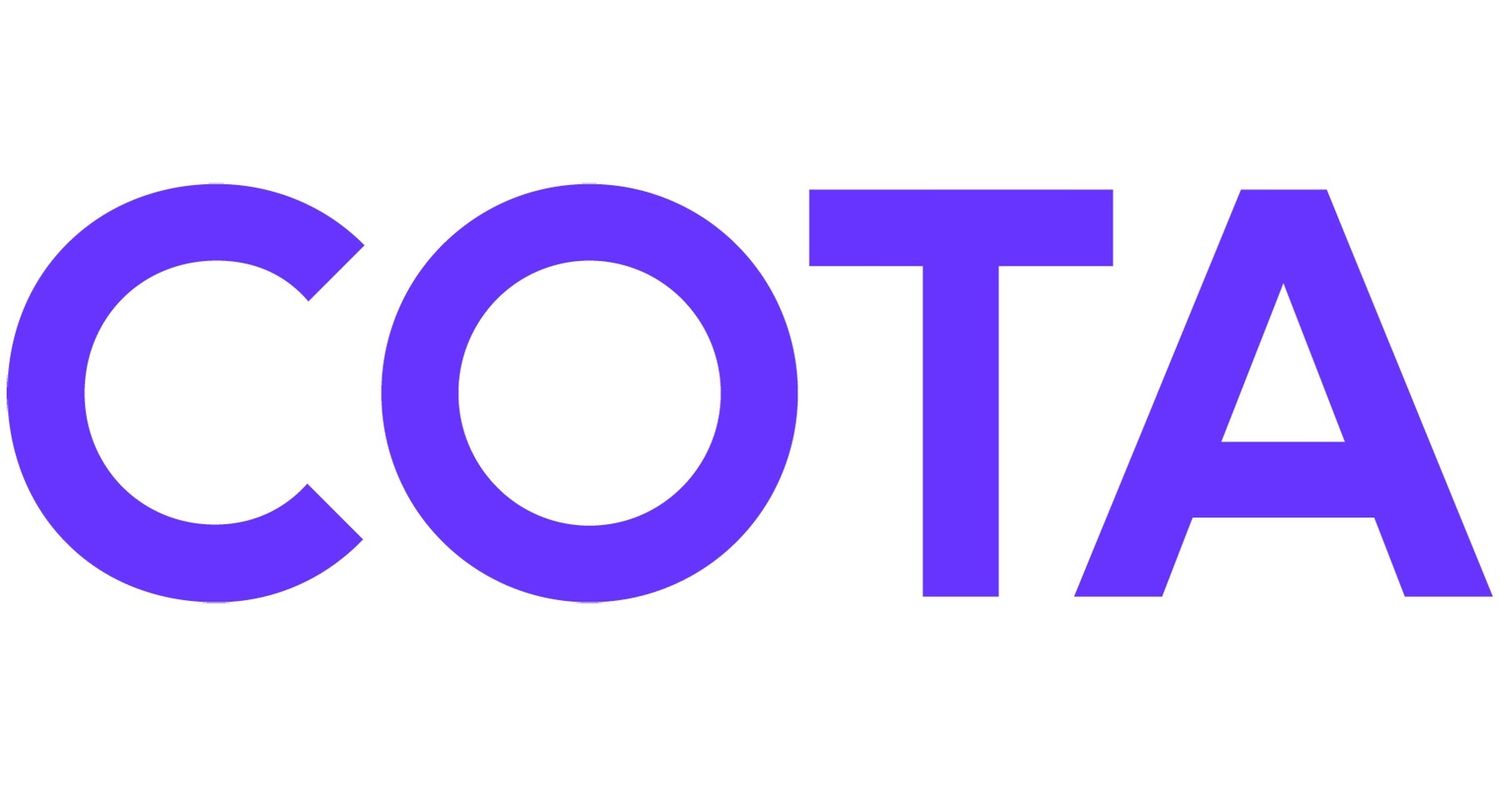更新于:2024-11-04

Cota, Inc.
更新于:2024-11-04
概览
关联
3
项与 Cota, Inc. 相关的临床试验Randomized Trial Evaluating the Effectiveness of MYnd Analytics Directed Therapy in Depression
The MYnd Analytics PEER Online strategy utilizes EEG diagnostics to direct patients with psychiatric illnesses to the best medication treatments. This trial will evaluate patients with a diagnosis of depression who will either receive (1) PEER Online directed therapy or (2) conventional treatment without EEG guidance and will compare 6 month clinical and economic outcomes between these groups.
开始日期2017-10-01 |
申办/合作机构  Cota, Inc. Cota, Inc. [+2] |
Quantitative Targeted Proteomics Detected by Mass Spectrometry With Whole Genome (DNA) and Whole Transcriptome (RNA) Sequencing in Advanced Cancers
Among patients with advanced (metastatic) cancers, detailed characterizations of the tumor utilizing genomic and proteonomic techniques may help guide treatment. It, however, remains unclear if these new diagnostic technologies truly influence clinical and economic outcomes. This study will evaluate if patients treated according to the results of the NantHealth GPS Cancer test achieve optimal outcomes compared to patients whose treatment are discordant with GPS Cancer recommendations.
开始日期2017-02-28 |
申办/合作机构  Cota, Inc. Cota, Inc. [+2] |
A Prospective Observational Study of Comprehensive Genomic Profiling in Previously Untreated Metastatic Non-small Cell Lung Cancer
Overall survival rates for patients with metastatic NSCLC are poor utilizing conventional cytotoxic chemotherapy approaches. However, a subset of patients harbor genomic driver mutations, which when targeted with specific therapies, experience improved outcomes.
Unfortunately, identification of these mutations, although recommended in national guidelines, has been limited for a variety of factors including small biopsy samples. The broad application of a sensitive genomic profiling test, which simultaneously examines for multiple genomic alterations on limited biopsy material, could increase the identification of patients with actionable mutations and thereby improve survival in NSCLC. The FoundationOne test meets these requirements. A recent study using the FoundationOne assay identified a significant number of actionable mutations among NSCLC patients who were previously thought to be negative for mutations when tested using other approaches.
This is a non-randomized observational comparative study with various cohorts based on physician diagnostic patterns of care and biologic genomic profile status. Survival and cost information will be compared based on different use of genomic profiling.
Unfortunately, identification of these mutations, although recommended in national guidelines, has been limited for a variety of factors including small biopsy samples. The broad application of a sensitive genomic profiling test, which simultaneously examines for multiple genomic alterations on limited biopsy material, could increase the identification of patients with actionable mutations and thereby improve survival in NSCLC. The FoundationOne test meets these requirements. A recent study using the FoundationOne assay identified a significant number of actionable mutations among NSCLC patients who were previously thought to be negative for mutations when tested using other approaches.
This is a non-randomized observational comparative study with various cohorts based on physician diagnostic patterns of care and biologic genomic profile status. Survival and cost information will be compared based on different use of genomic profiling.
开始日期2015-04-01 |
申办/合作机构  Cota, Inc. Cota, Inc. [+2] |
100 项与 Cota, Inc. 相关的临床结果
登录后查看更多信息
0 项与 Cota, Inc. 相关的专利(医药)
登录后查看更多信息
26
项与 Cota, Inc. 相关的新闻(医药)2024-07-17
NEW YORK--(
BUSINESS WIRE
)--COTA, Inc., in collaboration with Texas Oncology’s Precision Health Informatics, LLC (PHI), announces an innovative collaboration aimed at revolutionizing precision medicine across Texas Oncology’s community cancer centers. Leveraging COTA’s AI-powered curation engine, CAILIN™, this collaboration will transform fragmented healthcare data into actionable insights.
Unlocking Insights from Electronic Health Records (EHRs)
Electronic health records contain a comprehensive account of a patient’s cancer care journey. However, their unstructured and incomplete format poses challenges for analysis. By infusing AI into data processing, COTA and PHI aim to accelerate precision medicine at the point of care.
High-Quality Data as the Foundation
Lori Brisbin, chief operating officer of Precision Health Informatics, emphasizes the importance of clean, accurate data: “As we invest in AI, a solid data foundation is crucial. COTA’s AI-powered curation engine enables Texas Oncology to derive meaningful insights and deliver personalized care to patients.”
Generative AI and Real-World Data
Dr. C.K. Wang, chief medical officer at COTA, highlights the promise of generative AI: “By meshing automation and supervision of high-quality real-world data (RWD), COTA is changing the dynamics of cancer care.”
About Precision Health Informatics and Texas Oncology
Precision Health Informatics, a Texas Oncology subsidiary, uses patients’ genetic information for innovative cancer testing and treatment. Its data-driven solutions are based on insights from a diverse patient base. Learn more at Precisionhealthinformatics.com.
Texas Oncology, with more than 530 physicians and 280 locations, provides comprehensive, community-based cancer care. Its robust clinical trials and research program has contributed to over 100 FDA-approved cancer therapies. Visit
TexasOncology.com
for more information.
About COTA, Inc.
Founded by oncologists, COTA focuses on precise, patient-first cancer care using real-world data. Their advanced analytics platform partners with life sciences companies, providers, and payers to improve cancer treatment. Learn more at
cotahealthcare.com
.
2024-05-22
NEW YORK--(BUSINESS WIRE)-- Today, COTA announced an extension of its research collaboration with the U.S. Food and Drug Administration’s (FDA) Oncology Center of Excellence. Under the collaboration, the two organizations will continue to jointly develop and implement research projects to advance the use of real-world data (RWD) and explore the potential strengths and limitations of using real-world evidence (RWE) for regulatory purposes.
This collaboration serves as an extension of the agreement between COTA and the FDA established in 2018. To date, the partnership has yielded numerous oncology research studies that have been presented at the annual meetings of the American Society of Hematology (ASH) and the American Association of Cancer Research (AACR).
The collaboration has been extended for an additional 5 years, focusing on leveraging real-world evidence to strengthen regulatory decision-making. COTA and the FDA will evaluate RWD study designs and analytic methods through the collaborative development of priority, clinically meaningful research questions regarding care, treatment, and outcomes of patients with cancer.
“We are excited to continue our work with the FDA to explore the use of real-world data in oncology research and drug development,” said C.K. Wang, COTA’s chief medical officer. “Collaboration with institutions like the FDA are critical to advancing the speed and accuracy in which new drugs are evaluated and made available to patients.”
This collaboration will facilitate the use of new oncology data sources to support the mission of the OCE Scientific Collaborative. Additionally, the collaboration will support a better understanding of the use of therapies and associated diagnostics in real-world settings, along with exploration of the modifiable and non-modifiable factors influencing outcomes in real-world practice to inform regulatory science objectives.
About COTA, Inc.
Founded by oncologists, COTA is committed to creating a precise, patient-first approach to cancer care through the use of real-world data. The company leverages technology-supported data abstraction methods to make sense of complex, fragmented patient data from the real world. Offering the highest quality oncology real-world data from leading academic and community-based cancer centers and an advanced analytics platform, COTA partners with leading life sciences companies, providers, and payers to ensure that everyone touched by cancer has a clear path to the right care. To learn more about COTA and how to fast-track improvements in cancer care and treatment with comprehensive and diverse real-world data and analytics, visit cotahealthcare.com.
ASH会议
2024-05-20
When it comes to considering data partners, Komodo Health is interested in possible use cases and potential for maximum impact, executives said.
Komodo Health, a healthcare data analytics company, announced two new specialty data partners last week that aim to expand the insights of its platform.
MapEnhance, first unveiled in 2023, features a library of specialty data sets from Komodo and its partners. They can be linked with Komodo’s Healthcare Map, an anonymized data set on more than 330 million Americans, to drive nuanced research inquiries.
The latest partners to be announced are GeneDx, with its rare disease genomics data, and COTA Healthcare, which brings in clinical oncology data. Komodo has also been expanding its own data products (PDF), including clinical observations, lab results, insurance coverage, mortality and patient race and ethnicity.
The platform expansion comes at a time when there is a growing interest in real-world data, Komodo and COTA executives said in interviews.
Organizations specializing in data are coming to Komodo because they see the value in a potential partnership, said co-founder and president Web Sun. They request to go to market together to offer the combined power of their data sets to end users and to ultimately benefit patients via MapEnhance.
“We keep getting approached,” Sun said. “For us, that’s a really strong validation of the approach that we’ve taken.”
“Clients are looking to understand a fuller view of patients,” Sandy Leonard, COTA’s chief commercial officer, told Fierce Healthcare.
Historically, research questions have been limited because the scope of their data has been limited, Sun said. Now, with the combined capabilities offered via MapEnhance, they are getting at the outcomes—able to compare the effectiveness of various treatments, or how drug adherence or other social determinants of health (SDOH) can impact outcomes.
“The questions have always been so rudimentary,” Sun said. “Now we’re saying, does it actually change an outcome for a patient, does it actually improve survival?”
This year, there were 33 new Komodo-powered health economics and outcomes research (HEOR) studies presented at the International Society for Pharmacoeconomics and Outcomes Research Global Conference. One such peer-reviewed study leveraged Komodo’s race and ethnicity data asset to analyze medication adherence among schizophrenia patients. Another study leveraged Komodo and a genomics partner data set to validate the accuracy of an algorithm used to identify certain breast cancer patients in claims data.
COTA, which partners with oncology clinics to get EHR data, has often participated in regulatory use cases and is looking to grow its position in HEOR, per Leonard. Komodo is a helpful partner to start with because of its experience in this realm. In addition to serving end users through MapEnhance, COTA is thinking about ways to build on its data using Komodo. As one example, COTA might be able to use Komodo or partners' data to help fill gaps in SDOH or race data in its own data.
“One of the benefits of being able to do that type of overlap is you kind of build out that patient 360-degree view—you’re getting all the aspects of the patient,” Leonard said. But, she cautioned, the more overlapping data points there are, the more the risk of re-identification of a patient goes up. Komodo helps think about those privacy concerns, she added, calling it “one of those additional value-adds for the end client.”
Indeed, part of the advertised Komodo appeal is its rigorous process for de-duplicating, normalizing, analyzing and collecting data as they enter its Healthcare Map. “We make it easy, we make it high quality, we make it high trust,” Sun said.
When it comes to considering data partners, Komodo looks at possible use cases and the potential for maximum impact, Sun said. If an organization's data are too niche and limited in scope, they can’t truly move the needle. Komodo also assesses whether an organization is collecting its data in the right way and what the overall value-add would be to the ecosystem of Komodo partners and clients.
Historically, with oncology drugs, life sciences players have focused more on clinical outcomes—not necessarily the value of those outcomes, Leonard said. With the Inflation Reduction Act, Leonard expects there to be a push to understand their cost implications as much as their clinical outcomes. MapEnhance is well positioned to support those use cases, Leonard said.

100 项与 Cota, Inc. 相关的药物交易
登录后查看更多信息
100 项与 Cota, Inc. 相关的转化医学
登录后查看更多信息
组织架构
使用我们的机构树数据加速您的研究。
登录
或

管线布局
2024年11月20日管线快照
无数据报导
登录后保持更新
药物交易
使用我们的药物交易数据加速您的研究。
登录
或

转化医学
使用我们的转化医学数据加速您的研究。
登录
或

营收
使用 Synapse 探索超过 36 万个组织的财务状况。
登录
或

科研基金(NIH)
访问超过 200 万项资助和基金信息,以提升您的研究之旅。
登录
或

投资
深入了解从初创企业到成熟企业的最新公司投资动态。
登录
或

融资
发掘融资趋势以验证和推进您的投资机会。
登录
或

标准版
¥16800
元/账号/年
新药情报库 | 省钱又好用!
立即使用
来和芽仔聊天吧
立即开始免费试用!
智慧芽新药情报库是智慧芽专为生命科学人士构建的基于AI的创新药情报平台,助您全方位提升您的研发与决策效率。
立即开始数据试用!
智慧芽新药库数据也通过智慧芽数据服务平台,以API或者数据包形式对外开放,助您更加充分利用智慧芽新药情报信息。
生物序列数据库
生物药研发创新
免费使用
化学结构数据库
小分子化药研发创新
免费使用